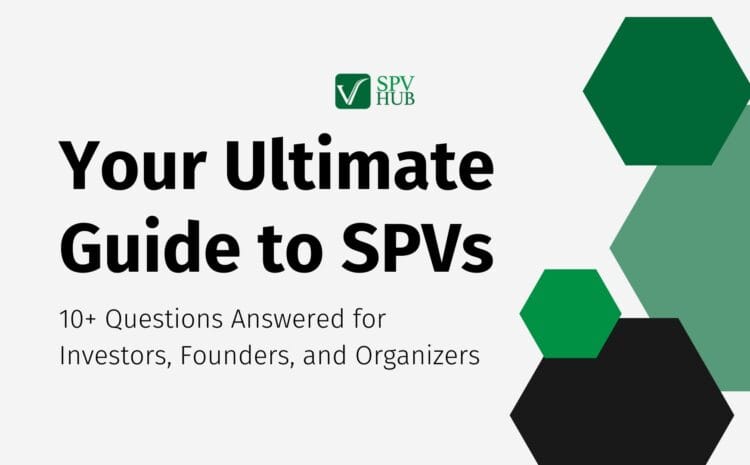Contents:
- Introduction
- What is an SPV?
- How does SPV work in the context of Startup investing?
- What is a syndicate deal?
- What are the advantages of using an SPV for startup investments?
- How are SPVs structured, and what are the legal and administrative requirements for setting up and managing an SPV?
- What are the costs associated with setting up and managing an SPV, and how are these costs typically shared among investors?
- What are the tax implications of investing in an SPV?
- What are Blue Sky filings?
- How do investors typically find and evaluate SPVs to invest in?
- How do SPVs differ from traditional venture capital funds?
- How does an Investor participate in a syndicate?
- Do you have to be accredited to invest in a syndicate?
Introduction:
Special Purpose Vehicles (SPVs) – the name may sound confusing to those unfamiliar with the term. It might evoke images of physical vehicles carrying money or goods from one place to another. However, in startup investing, SPVs are intangible vehicles that carry investment money to a specific destination. SPVs are legal structures used to invest in startups and are a popular choice for investors who want to pool their money together to invest in a specific startup or group of startups. Too much?
Don’t be overwhelmed. If all this sounds complicated, then you are not alone. SPVs, or Special Purpose Vehicles, are a relatively new concept in the world of startup investments that many investors and founders may need to become more familiar with. Whether you’re a first-time investor or a seasoned professional, this guide will give you a clear understanding of SPVs and how they can help you navigate the world of Startup investing.
As part of our role in the comprehensive startup ecosystem, we want to provide answers and insights about SPVs to those interested in learning more.
In this blog, we’ll be answering the top 12 questions related to SPVs, covering everything from the basics of what they are and how they work to the legal and financial requirements for setting up and managing an SPV. Whether you’re a new or experienced investor, founder, or organizer, our guide will give you a clear understanding of SPVs and how they can be a valuable tool in your startup investments.
What is an SPV?
SPV, or Special Purpose Vehicle, is a legal entity created to hold and manage investments in a startup. It works by pooling capital from multiple investors and investing it in a specific startup or portfolio. The SPV structure allows investors to participate in startup investments with lower minimum investment amounts and reduces the administrative burden and legal complexities associated with individual assets.
How does SPV work in the context of Startup investing?

Here’s an example: Let’s say you want to invest in a startup that needs $500,000 to get off the ground. Instead of investing all your money, you can join an SPV created to invest in that Startup. The SPV will pool money from different investors and then use that money to invest in the Startup. This means you can invest in the Startup with less money and share the risk with other investors in the SPV.
When the Startup starts generating revenue or is acquired, the SPV will distribute the profits to the investors based on their contribution to the SPV. The SPV is usually managed by a fund manager who will take care of all the legal and administrative requirements of the SPV.
In summary, SPVs provide a way for investors to pool their money together to invest in startups, making it easier for startups to raise capital and investors to invest smaller amounts of money.
What is a syndicate deal?
A syndicate deal refers to a type of investment arrangement where a group of investors pool their money together to invest in a specific opportunity, such as a startup or a real estate project. This type of deal is commonly used in venture capital, private equity, and angel investing. In a syndicate deal, each investor contributes a portion of the total investment amount and shares in the potential returns or losses based on their percentage of ownership. The deal is usually organized by a lead investor, who negotiates the terms of the investment with the company or project being funded.
What are the advantages of using an SPV for startup investments?
There are several advantages of using an SPV for startup investments:
- Diversification: An SPV allows investors to spread their investment across multiple startups, which reduces the risk of losing all of their money if one Startup fails.
- Limited liability: Investors in an SPV have limited liability, which means that they are only liable for the amount they invest, and their assets are not at risk.
- Simplified investment process: An SPV can streamline the investment process, as it handles all the legal and administrative requirements of investing in a startup.
- Access to expertise: SPVs are usually managed by experienced fund managers with expertise in investing in startups, which can help investors make better investment decisions.
- Reduced costs: By pooling money together, investors can reduce the costs associated with investing in startups, such as legal fees and due diligence costs.
- Potential for higher returns: Investing in startups can be risky, but it also has the potential for high returns. An SPV allows investors to participate in the potential upside of a startup without having to invest a large amount of money.
Overall, using an SPV can provide investors with access to a diversified portfolio of startups, reduce their risks and costs, and potentially generate higher returns.
How are SPVs structured, and what are the legal and administrative requirements for setting up and managing an SPV?

An SPV is typically structured as a limited liability company (LLC) or a limited partnership (LP). The SPV is created with the sole purpose of investing in a specific startup or a portfolio of startups. The structure of the SPV allows investors to pool their money together and invest in the Startup as a group.
To set up an SPV, the fund manager or the lead investor must draft the legal documents, such as the operating agreement, subscription agreement, and private placement memorandum, among others. These documents outline the terms and conditions of the investment, the roles and responsibilities of the investors, and the process for managing the SPV.
Team SPV Hub takes care of all legal formalities and mandates, simplifying the investment process.
What are the costs associated with setting up and managing an SPV, and how are these costs typically shared among investors?
Investing in an SPV can have tax implications, including potential tax benefits and complexities, and investors should consult with a tax advisor before investing. Investors can find and evaluate SPVs through online platforms or networking with other investors.
What are the tax implications of investing in an SPV?

Investing in an SPV can have different tax implications for different investors, depending on their jurisdiction and the specific tax laws that apply to them. Generally, however, investing in an SPV can offer some tax advantages for investors.
One advantage is that the SPV structure can help mitigate tax liabilities for investors. Since the SPV is a separate legal entity from the investors, it is responsible for paying taxes on any income generated from the investment. This means that investors can avoid paying taxes on their share of the income until it is distributed to them by the SPV.
Another advantage is that the SPV structure can enable investors to take advantage of specific tax incentives or exemptions that may be available in their jurisdiction. For example, some jurisdictions offer tax breaks for investments in startups or certain industries.
However, it’s important to note that investing in an SPV can also have some tax risks or complexities. For example, if the SPV generates losses, investors may be unable to use those losses to offset other taxable income. Additionally, investors may face withholding taxes or other tax obligations when investing in SPVs in different jurisdictions.
At SPV Hub, we take care of taxation formalities as well and keep you safe from IRS.
What are Blue Sky filings?
Blue Sky filings refer to the regulatory requirements that companies must comply with when selling securities to the public. The term “Blue Sky” comes from the laws and regulations created in the early 20th century by individual states in the United States to protect investors from fraudulent securities sales.
Blue Sky filings are a set of rules each state has to protect investors who invest in startups. When SPV Hub creates an SPV to invest in a startup, we have to file a notice in each state where our investors live. Each state has different rules, which can make things complicated. Plus, we pay a fee for each state we file in. But don’t worry; the SPV Hub team is experienced in filing Blue Sky fees, and we’ll ensure that your SPV investment is fully compliant with state regulations.
How do investors typically find and evaluate SPVs to invest in?
Investors usually search for available SPVs to invest in through networks, recommendations from others, or online platforms like SPV Hub. SPV Hub is a platform where various SPVs created by angel groups and fund organizers are hosted. This platform presents information about SPVs in a standardized format, making it simple for investors to screen through the details. Registering on the platform is easy, and investors can start exploring open SPVs to find the one that fits their investment goals.
How do SPVs differ from traditional venture capital funds?
SPVs and traditional venture capital (VC) funds are both vehicles for investing in startups, but they differ in several ways.
Firstly, the structure of an SPV is simpler and more flexible than a VC fund. An SPV is formed for a specific investment opportunity, while a VC fund pools money from multiple investors to invest in a portfolio of startups over several years.
Secondly, SPVs typically have fewer investors and smaller investment amounts compared to VC funds. This can allow for greater individual control over investment decisions and potentially higher returns on successful investments.
For example, let’s say a startup founder is seeking funding for a specific project. Instead of seeking funding from a traditional VC fund, they may create an SPV to raise money from a select group of investors who are interested in the project. In this case, the SPV allows for a more targeted and efficient fundraising process than a traditional VC fund.
Individual investors can invest in an SPV, although some may require investors to be accredited.
How does an Investor participate in a syndicate?
Investors can participate in a syndicate by joining a group of other investors who pool their money together to invest in a particular opportunity. This can be done through various channels such as Angel groups, online platforms, and personal networks. Typically, a lead investor or syndicate organizer will negotiate the terms of the investment and then invite other investors to participate. Once the group is formed, each investor contributes their share of the capital, and the syndicate then invests as a single entity. Investors benefit from access to investment opportunities that may not have been available to them individually and can spread their risk across a diversified portfolio.
Do you have to be accredited to invest in a syndicate?
Yes, in most cases, you need to be an accredited investor to participate in a syndicate deal. This is because syndicate deals involve investing in private securities that are not registered with the Securities and Exchange Commission (SEC). To be an accredited investor, you must meet certain income or net worth requirements set by the SEC. These requirements aim to ensure that investors have a certain level of financial sophistication and can afford to take on the risks associated with investing in private securities. However, there are some exceptions to the accreditation requirement, such as supporting through Regulation A+ or Regulation Crowdfunding offerings.
We hope this article has provided answers to some of the most common questions regarding SPVs. If you have any further questions or suggestions for future topics, please feel free to leave a comment below.
Join SPV Hub today and create SPVs within just a few days. Our streamlined platform offers a user-friendly interface, access to all necessary service providers, and the ability to invest within minutes.
With SPV Hub, you can be confident that you’re getting the best possible solution for your private market investments. Sign up now and start investing in the opportunities you’ve been waiting for.
Register as an investor here.
Want to set up an SPV? Feel free to get in touch with us via email at [email protected] or [email protected]
Disclaimer: The information provided is for educational and informational purposes only and should not be construed as financial or investment advice. Always research and/or consult a qualified financial advisor before making any investment decisions.








